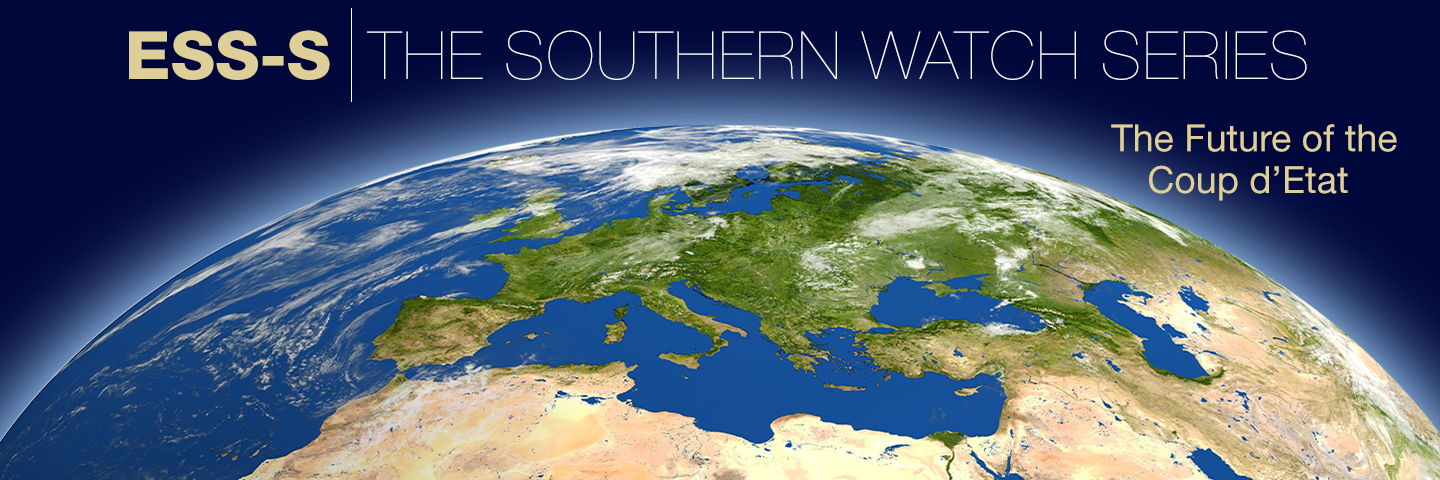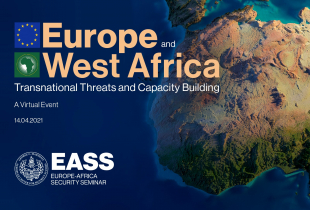
The Future of the Coup d’Etat
Introduction
Participants from Europe, Africa, the Middle East, and the United States gathered online in October 2021 to discuss the future of the coup d’état as part of the Southern Watch Series (SWS). The SWS is an ongoing series of virtual conversations surveying current and emerging security challenges in Africa and the Middle East, and their implications for Europe and the United States. It is an initiative of the Marshall Center’s European Security Seminar – South. The conversation featured remarks from Dr. Erica de Bruin of Hamilton College and Dr. Sebastian Elischer of the University of Florida. These highlights reflect non-attribution takeaways that emerged from group discussion and do not represent the views or positions of any individual panelist or participant.
Democratic backsliding by civilian authorities will likely generate more coups d’état.
Coups are always a bad sign, but they can signify different problems. In the past, a coup d’état – an overt attempt to unseat a sitting executive, backed by the threat or use of force – was usually a blatant power grab or a military statement of ‘no-confidence’ in a political leader. Militaries might resent interference in their affairs. They might fear imposed reforms, reduced budgets, or a redistribution of power. They might lament the perceived mishandling of an insurgency or civil war by the government, so they would seize control and refuse to cede power on the pretext that civilians cannot lead in wartime. Such coups have declined across the decades, plummeting since the Cold War’s end. Contemporary coups, by contrast, frequently disrupt a derailment of the democratic process by the civilian authorities – politicians who themselves are attempting a ‘self-coup,’ ‘soft coup,’ ‘creeping coup,’ or ‘constitutional coup,’ as in the case of a president who disregards electoral limits and clings to power. In these circumstances, military intervention in politics can be presented as a ‘coup to counter a coup.’ So-called Third Term-ism and similar maneuvers by civilian authorities pose a serious challenge to existing agreements and norms condemning unconstitutional changes of government. Curbing such manipulations in the future would likely reduce military coups.
Prospects of governance reform might sway some coup leaders.
Coup leaders may act on a desire for raw power, a frustration over perceived civilian incompetence, or a disdain for modern military standards. But at least some of today’s coup leaders are partially driven by a fear of civilian despotism and a hope of restoring free and open contestation to the realm of politics and policy. A coup may also begin as a simple expression of military grievance, in a mutiny that morphs into a coup when civilian structures instantaneously collapse. In short, not all coup leaders scorn the rule of law or harbor authoritarian motives. Efforts to prevent coups through military trainings on democratic norms and civil-military relations may therefore not entirely succeed. Trainees might feel committed to good governance principles in the abstract, but unlike their ‘model’ trainers (whose own countries, ironically, have sometimes experienced coups within living memory), trainees regularly face major obstacles to implementing these principles in their own fragile and complicated politico-military landscapes. Under such conditions, additional trainings will never eliminate coups altogether. Yet with alternatives scarce, training to prevent coups sometimes continues even after faith in it flags, generating cynicism among trainers and trainees alike. Today’s coups d’état need not produce the iron-fisted juntas or the lasting military dictatorships of yesteryear, however. Given the different drivers at work, coup leaders might respond to pressure to ‘return to the barracks’ when it is coupled with the promise of government reform and comes from stakeholders – external partners or civil society associations – with whom their own motivations actually align, at least in part.
Free and fair elections must serve to contain the coup d’état and extricate the military from politics.
Democracy should reduce coups in the long run, but it ought to be recognized that pressing for change in governmental and institutional arrangements can actually provoke coups in the short run. Security sector reform, for instance, can disturb a legacy of counterbalancing one stove-piped force against another – a recognized ‘coup proofing’ technique adopted by autocrats. Coup management should focus on extricating the military from politics in the wake of a coup d’état, especially through multi-party elections of the sort that have followed nearly every coup since the Cold War. Coup leaders almost always attempt to influence or outright rig these elections, and some militaries have become quite skilled at manipulation, allowing a return to constitutional order only to undermine democratic procedures from a distance. The international community, meanwhile, tends to fixate on the speed with which elections are held, eager to restore as quickly as possible a sense of normality and a return to security cooperation agreements. To serve their real purpose, however, post-coup elections must above all be free and fair. They should allow for genuine political progress, which requires constant pressure to ensure that timelines are strictly kept, civilians are free to act, and the military does not participate in the elections or engineer their results.
The ability of external actors to prevent or control coups d’état is limited.
Outsiders are often better positioned to shape the aftermath of a coup than to prevent a coup from happening in the first place. The international community should be vigilant to ensure that security assistance does not encourage or precipitate coups, but it must also endeavor to improve its responses to coups once they take place. Inconsistency often undercuts the moral authority of external actors reacting to a coup. Unfortunately, but unsurprisingly, neighboring and external states tend to label, condemn, and sanction coups d’état selectively, with one eye toward principle and another toward interest (in terms of geopolitics, defense, security, arms sales, refugee and migration flows, access to oil and other resources, and so on). External actors might resist applying the label coup d’état if doing so risks alienating a lynchpin country and driving it into the arms of strategic rivals. Such nations are ‘too big to coup,’ as it were. Meanwhile, external actors will occasionally turn a blind eye toward a coup that is seen as ‘failing upward’ (by unseating a ‘president for life,’ for example). In the wake of a coup d’état, external actors should apply lessons they have learned from dealing with human rights abusers or illegitimate regimes, devising ways to communicate with coup leaders without validating them, in order to understand their motives and to gain influence. All engagement should follow stringent conditions and reinforce international anti-coup norms and frameworks. The international community should always maintain pressure regarding post-coup elections, including through incentives and disincentives in terms of further security sector assistance and other aid.
Citizens are ultimately the strongest bulwark against coups d’état.
Acceptance of military rule has declined, and the expectation that government should be civilian – and preferably democratic – has risen in recent decades. After a coup, ordinary people often resist military rule more staunchly and demand democracy more radically than foreign states or international organizations. People may appreciate a coup d’état at first, when it sweeps away a corrupt and abusive leader or regime, but they tend to change opinions soon after, protesting prolonged ‘transitions’ and power-sharing agreements that anchor the military as a quasi-permanent force in political life. Citizens play an essential role in shepherding the crisis caused by a coup d’état toward an optimum resolution, one that reduces the nation’s susceptibly to future coups. As the Arab Spring showed, street demonstrations affect elite decision-making, and those post-coup leaders painted after-the-fact as ‘democratic’ (for living up to commitments and timelines) are usually operating, in actuality, under sustained popular pressure. Military ownership of the political sphere is by nature antithetical to strong civilian institutions and an active civil society, and external partners should buttress these elements, so that they are resistant to being coopted, becoming divisive, or turning themselves anti-democratic (especially in the face of disappointing economic progress after initial attempts at democratization). Popular mobilization is critical in the first moments of a coup d’état, when the result hangs in the balance. The shock of seeing soldiers marching in the capital city, enacting violence and imposing curfews, can spark immediate street protests. By contrast, the incremental steps to capture the executive that characterize today’s ‘constitutional coups’ are purposefully fine-tuned to circumvent popular dissent. Citizens must learn to mobilize early and effectively against such gradational unconstitutional changes of government, if they are to help protect their nations from today’s many types of coups d’état.
GCMC, Garmisch-Partenkirchen, October 6, 2021
About the Author
Dr. Benjamin P. Nickels is Professor of International Security Studies and Director of the European Security Seminar – South (ESS-S) at the George C. Marshall European Center for Security Studies. He leads the Marshall Center’s resident, outreach, virtual, and partnership programming on European and U.S. relations with North Africa, Sub-Saharan Africa, and the Middle East.
The George C. Marshall European Center for Security Studies
The George C. Marshall European Center for Security Studies in Garmisch-Partenkirchen, Germany is a German-American partnership and trusted global network promoting common values and advancing collaborative geostrategic solutions. The Marshall Center’s mission to educate, engage, and empower security partners to collectively affect regional, transnational, and global challenges is achieved through programs designed to promote peaceful, whole of government approaches to address today’s most pressing security challenges. Since its creation in 1993, the Marshall Center’s alumni network has grown to include over 16,000 professionals from 160 countries. More information on the Marshall Center can be found online at www.marshallcenter.org.
The Clock Tower Security Series provides short summaries of Seminar Series hosted by the George C. Marshall European Center for Security Studies. These summaries capture key analytical points from the events and serve as a useful tool for policy makers, practitioners, and academics.
The articles in the The Clock Tower Security Series reflect the views of the authors and are not necessarily the official policy of the United States, Germany, or any other governments.
